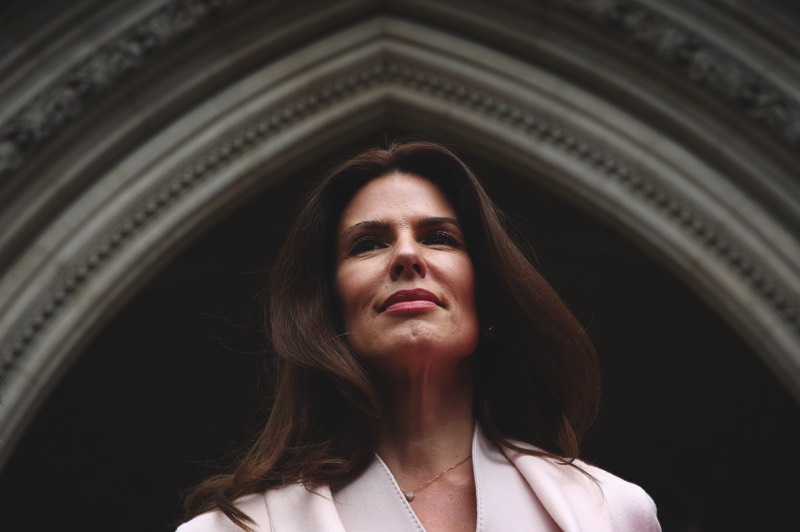LEGAL
Surrey’s Premier Lifestyle Magazine
The model and the sheikh
Judith Fitton, Partner at Mundays LLP, discusses maintenance and pre-nuptial agreements in the light of a recent high profile case in the courts.

PHOTO COPYRIGHT: Getty Images
The Pirelli model, the sheikh and the £53 million divorce settlement…It’s an old story that the newspapers love – the beautiful young model marries the older wealthy man and then divorces him for millions.
Christina Estrada hit the headlines this summer for seeking £238 million in her divorce from Dr Walid Juffali, a Saudi billionaire, after 12 years of marriage. She claimed that she required a £68 million house in Belgravia, a second home in Henley-upon-Thames for £4 million, £1 million per annum for clothes and half a million pounds to buy five cars. She was accused by Dr Juffali’s barrister of making “excessive and exaggerated demands” and struggled to convince the Court that her claims were rooted in reality rather than fantasy.
Whilst she didn’t succeed entirely, the Court limiting her claim to just £53 million, she looked victorious when pictured outside the Royal Courts of Justice after the hearing.
But behind the headlines is a tale of long litigation. The parties separated after 12 years of marriage and after having a daughter, now aged 13. Dr Juffali divorced Ms Estrada under Islamic law without her knowledge and then married a TV presenter 32 years his junior. Ms Estrada was denied any financial award in Saudi Arabia, so filed an application in London, on the basis that the family were domiciled here.
Dr Juffali spared no expense to fight her claims. He acquired a post as the representative for St Lucia at the International Maritime Organisation (despite having no knowledge of maritime affairs) and then refused to participate in the English proceedings, citing diplomatic immunity. When that appointment was ruled as an entirely artificial construct, the parties were then set for a final hearing in the High Court. Yet in another twist, Dr Juffali was then diagnosed with cancer and was unable to be present for the hearing as he was too ill to leave his hospital bed in Zurich. He has since passed away, which may leave Ms Estrada in difficulties in enforcing her award against his estate.
Christina Estrada hit the headlines this summer for seeking £238 million in her divorce from Dr Walid Juffali, a Saudi billionaire, after 12 years of marriage. She claimed that she required a £68 million house in Belgravia, a second home in Henley-upon-Thames for £4 million, £1 million per annum for clothes and half a million pounds to buy five cars. She was accused by Dr Juffali’s barrister of making “excessive and exaggerated demands” and struggled to convince the Court that her claims were rooted in reality rather than fantasy.
Whilst she didn’t succeed entirely, the Court limiting her claim to just £53 million, she looked victorious when pictured outside the Royal Courts of Justice after the hearing.
But behind the headlines is a tale of long litigation. The parties separated after 12 years of marriage and after having a daughter, now aged 13. Dr Juffali divorced Ms Estrada under Islamic law without her knowledge and then married a TV presenter 32 years his junior. Ms Estrada was denied any financial award in Saudi Arabia, so filed an application in London, on the basis that the family were domiciled here.
Dr Juffali spared no expense to fight her claims. He acquired a post as the representative for St Lucia at the International Maritime Organisation (despite having no knowledge of maritime affairs) and then refused to participate in the English proceedings, citing diplomatic immunity. When that appointment was ruled as an entirely artificial construct, the parties were then set for a final hearing in the High Court. Yet in another twist, Dr Juffali was then diagnosed with cancer and was unable to be present for the hearing as he was too ill to leave his hospital bed in Zurich. He has since passed away, which may leave Ms Estrada in difficulties in enforcing her award against his estate.
‘Silver nups’
More couples are separating later in life and happily, a fair proportion of those are then going on to remarry.If they have children from their first marriage, we encourage them to consider a pre-nuptial agreement or “silver nup” as they have been dubbed, to protect their children’s inheritance. This is an agreement reached with their future spouse, which would set out how they want their assets to be split in the event of a later divorce. The agreement can avoid family disputes and reassure the children that the “family money” is being protected.
Whilst such agreements are not yet enshrined in law, if certain safeguards are followed, they are likely to be upheld by the Courts on a later divorce. The safeguards include both parties having their own solicitors, both providing full details of their finances and the agreement being signed at least a month before the wedding. The agreement should also take into account at least the minimal needs of both parties and this means that a tailored, bespoke document is best.
We have enquiries almost every week about pre-nuptial agreements. We are finding that couples are much more ready to talk about signing such a contract now and no longer view them as being unromantic, rather a sensible precaution to take to protect capital assets, built up over many years.
Avoid the wish list syndrome on maintenance awards
The Estrada case is an extreme example of a maintenance case on a divorce and it won’t be appropriate for every claimant to include items such as £116,000 for handbags or £83,000 for cocktail dresses. But it does highlight the need for parties to prepare their case properly.
On a split, both parties need to work out carefully what their annual needs will be in the future, including the needs of any children. This budget should include the cost of a mortgage, pension contributions and school fees and be as realistic as possible, but avoid accusations of being a “wish list”. The parties then need to assess their likely future income and if either, (normally the wife), has a deficit, then they may have a claim against the other for monthly maintenance payments.
The days of the ‘meal ticket for life’ are gone now and the Court will scrutinise a wife’s claim for maintenance very carefully as to quantum and the requested term. The principle of equal sharing, which is often applied to the matrimonial capital, does not apply to the husband’s income as well, and the wife will only be awarded maintenance if it can be justified on the basis of her need or as compensation.
The Court has a duty to consider imposing a “clean break” or the severance of all financial ties in all cases and the ultimate goal is to get both parties back on the road to independent living.
In some cases that is not possible, but it is now the general rule, that both parties are expected to work, if they are below retirement age. It was held recently by the Courts that by the time the youngest child of the family start in Year 2 at school, wives could be expected to be looking for part time employment and this income will then be applied towards reducing their maintenance award.
Maintenance can be awarded for a limited amount of time (a term Order) or unlimited (a joint lives Order). A term Order can only be made if the Court considers that the wife would be unable to adjust without undue hardship to payments being terminated. This may be clear cut in the case of a 55 year old woman who has not worked for twenty years, but less easy to assess in the case of a younger woman who perhaps has carried on working during the marriage, but is unlikely to ever be able to match the earning power of her husband.
The vast majority of divorcing couples reach agreement as to their financial split and if both can take a sensible and practical view as to the potential need for maintenance, this will increase their chances of avoiding a Court hearing. As ever, expert evidence from a specialist solicitor is advisable and we would be happy to answer any queries.
The Estrada case is an extreme example of a maintenance case on a divorce and it won’t be appropriate for every claimant to include items such as £116,000 for handbags or £83,000 for cocktail dresses. But it does highlight the need for parties to prepare their case properly.
On a split, both parties need to work out carefully what their annual needs will be in the future, including the needs of any children. This budget should include the cost of a mortgage, pension contributions and school fees and be as realistic as possible, but avoid accusations of being a “wish list”. The parties then need to assess their likely future income and if either, (normally the wife), has a deficit, then they may have a claim against the other for monthly maintenance payments.
The days of the ‘meal ticket for life’ are gone now and the Court will scrutinise a wife’s claim for maintenance very carefully as to quantum and the requested term. The principle of equal sharing, which is often applied to the matrimonial capital, does not apply to the husband’s income as well, and the wife will only be awarded maintenance if it can be justified on the basis of her need or as compensation.
The Court has a duty to consider imposing a “clean break” or the severance of all financial ties in all cases and the ultimate goal is to get both parties back on the road to independent living.
In some cases that is not possible, but it is now the general rule, that both parties are expected to work, if they are below retirement age. It was held recently by the Courts that by the time the youngest child of the family start in Year 2 at school, wives could be expected to be looking for part time employment and this income will then be applied towards reducing their maintenance award.
Maintenance can be awarded for a limited amount of time (a term Order) or unlimited (a joint lives Order). A term Order can only be made if the Court considers that the wife would be unable to adjust without undue hardship to payments being terminated. This may be clear cut in the case of a 55 year old woman who has not worked for twenty years, but less easy to assess in the case of a younger woman who perhaps has carried on working during the marriage, but is unlikely to ever be able to match the earning power of her husband.
The vast majority of divorcing couples reach agreement as to their financial split and if both can take a sensible and practical view as to the potential need for maintenance, this will increase their chances of avoiding a Court hearing. As ever, expert evidence from a specialist solicitor is advisable and we would be happy to answer any queries.
essence info
Mundays LLPCedar House, 78 Portsmouth Road, Cobham KT11 1AN
Telephone: 01932 590500
Website: www.mundays.co.uk
Profile
Judith is a Partner in the Family Team at Mundays LLP and has over 20 years of experience in the field of high net worth divorces. She has a particular skill in the forensic aspect of cases and investigating complex financial arrangements.Judith also has a niche practice in cohabitee matters and any disputes between non-married couples regarding their property interests. She is accredited as a Specialist in the fields of Cohabitee Disputes and Complex Financial Remedies by Resolution (a national organisation of family lawyers).
She has been mentioned in The Legal 500 UK as a recommended family lawyer and is known for her pragmatic and constructive advice to clients. She is a regular contributor to articles in the national press.
Judith can be contacted by telephone on 01932 590557 or by email at judith.fitton@mundays.co.uk
Twitter: @judith_fitton

